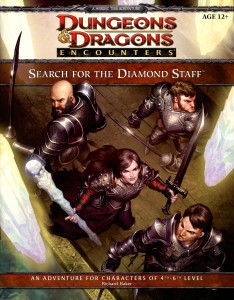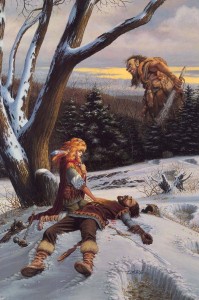 With GenCon coming up many of the gaming blogs (this one included) will start running a series of articles sharing advice on things to do, things not to do, and general tips for making you convention experience great. Today I want to focus specifically on the masses that will be playing D&D Next at this year’s GenCon. Some of the tips and suggestions I make will be common sense things that apply to any edition of D&D or any RPG for that matter; others will be specific to D&D Next. If you’re play D&D at GenCon I encourage you to review the list below and try to remember as many of these as possible while at the con.
With GenCon coming up many of the gaming blogs (this one included) will start running a series of articles sharing advice on things to do, things not to do, and general tips for making you convention experience great. Today I want to focus specifically on the masses that will be playing D&D Next at this year’s GenCon. Some of the tips and suggestions I make will be common sense things that apply to any edition of D&D or any RPG for that matter; others will be specific to D&D Next. If you’re play D&D at GenCon I encourage you to review the list below and try to remember as many of these as possible while at the con.
Tag: Dungeon’s Master
On Friday we comb through our extensive archives to find an older article that we feel deserves another look. From March 2, 2012, Dungeon’s Master once again presents: 8 Ways to Get Out of a Gaming Slump and Make Your Game More Exciting.
It’s common for people in long-term relationships to talk about how the romance is gone. They remember how it used to be: the anticipation, the excitement, the thrill. But now things are just so-so. They go through the motions and wonder where it all went. They still love their partner and want stay with them, but they know the need a change. They look for ways to spice things up in an attempt to rekindle the lost romance.
A similar phenomenon can happen to gamers who play a lot of D&D (believe me, I know). You enjoy D&D and you’re not looking to play a different game, you just want to make each session a little bit more exciting. Sure you face new challenges and new monsters each time you play but so much of the gaming experience has become repetitive and routine. How do you bring back the romance and ignite the spark of excitement you once had when you first started playing D&D? We have 8 ways to get out of a gaming slump and make your game more exciting.
These suggestions are ways for individual players in a larger gaming group to make changes that will really only affect them. After all, it’s possible that the rest of the group is having a great time and wouldn’t change a thing if they could. These ideas can spice up your D&D experience without intruding or ruining anyone else’s good time.
 Our heroes managed to talk their way past combat during the past two weeks; this week they were not as lucky and nearly suffered a TPK. The session began when the party arrived at the edge of the Elvin runes where the spotted the Zhentarim’s campsite. There were no signs of the soldiers, Phoedele, or the Diamond Staff. Whether the PCs wanted to or not, they were going to have to venture deeper into the woods in search of their prize.
Our heroes managed to talk their way past combat during the past two weeks; this week they were not as lucky and nearly suffered a TPK. The session began when the party arrived at the edge of the Elvin runes where the spotted the Zhentarim’s campsite. There were no signs of the soldiers, Phoedele, or the Diamond Staff. Whether the PCs wanted to or not, they were going to have to venture deeper into the woods in search of their prize.
This week at the Silver Snail in Toronto we ran two tables. The 4e table was packed with seven players and the D&D Next table (which I ran) was down to five players. The party consisted of an Elf Wizard, Human Fighter, Human Wizard, Halfling Rogue (re-skinned as a Bard), and Half-Elf Cleric.
In a clearing at the edge of the woods the PCs found the Zhent’s horses. The horses were skittish, but not because of the PCs. Unfortunately with the Ranger absent none of the other PCs were able to get a read on why the horses were acting strangely. Ignoring the campsite and the mundane equipment left behind, the PCs proceeded cautiously into the woods. The path before them was shrouded by sheets of thick spider webs.
 One of the challenges most commonly faced by adventuring parties is the ability to heal wounds quickly and easily. Time heals all wounds, but in the heat of battle time is a precious commodity. You’re not likely to leave the fight and rest for a few days when you can keep swinging your blade or slinging your spells in hopes of defeating the foe in front of you right now. That’s where magical healing comes in.
One of the challenges most commonly faced by adventuring parties is the ability to heal wounds quickly and easily. Time heals all wounds, but in the heat of battle time is a precious commodity. You’re not likely to leave the fight and rest for a few days when you can keep swinging your blade or slinging your spells in hopes of defeating the foe in front of you right now. That’s where magical healing comes in.
In 4e D&D the leader classes took on equal responsibility for healing. The powers to heal were abundant, minor actions that you could throw around from great distances. Let’s face it, in 4e any party with a half-competent leader shouldn’t have suffered many losses. Between Healing Word (or the equivalent) and Second Wind there was plenty of healing to go around. Healing was fast and easy.
As appealing as this abundant healing was to some players (me included), it was a radically different approach than what we’d seen in previous editions of D&D. Traditionally in D&D the Cleric was the healer. Other classes had abilities and powers that let them provide supplemental healing but the Cleric was usually the primary medic. This is the direction that magical healing has taken in D&D Next – it’s back to the Cleric as party healer with Paladin, Ranger and Druid providing back-up support.
Making the Cleric special again by giving them exclusivity in the super healing department is fine with me. However, most healing is now limited to a range of touch. The Cleric has to get up close and personal to heal the wounded or revive the fallen. This is how things used to work and it looks like this is how things will work again. Fair enough. But after playing 4e for so long it’s tough to go back to the idea that healers are hands on.
Friday Favourite: The Spoils of War
On Friday we comb through our extensive archives to find an older article that we feel deserves another look. From March 26, 2009, Dungeon’s Master once again presents: The Spoils of War.
When the fighting ends and the dust settles, it’s time to look at the spoils of war. How will your PC claim his fare share of the reward when the war ends? Your character’s motives for fighting will be the best guide for the DM when he decides how to reward the players.
But before anyone gets to claim the spoils of war, let’s quickly look at how the PCs got here in the first place.
Ameron’s 2013 GenCon Schedule
 In less than a month GenCon 2013, The Best Four Days in Gaming will be upon us. I’ve been counting down the days since Christmas and according to the app on my phone there are only 29 days to go.
In less than a month GenCon 2013, The Best Four Days in Gaming will be upon us. I’ve been counting down the days since Christmas and according to the app on my phone there are only 29 days to go.
GenCon, like any gaming convention, presents you with the opportunity to play your favourite games, try new games, make new friends in the gaming community, and essentially geek out for four straight days. Every year I post my schedule for two reasons: 1) to highlight the great events I plan to participate in, and 2) to make it easier for you to find me at the con.
Here’s what my schedule looks like so far. Some things may change on the fly but this is what I already have tickets for or what I plan to wait in line with generic tickets to play.
DMs for GenCon Needed… Badly
Dave Christ (a.k.a. The Baldman from Baldman Games), the guy who spearheads and coordinates all of the D&D events at GenCon, needs your help. With less than a month until GenCon it seems that they’re in desperate need for more DMs to run the D&D Next delve.
If you’ve going to GenCon and have any blocks of free time in your schedule please consider being a DM for even just one slot. DMs are rewarded with free swag and if you’re willing to run multiple slots you can earn a free convention badge and even a free room. For every one person who volunteers to DM, six players get a chance to play at the con.
On Friday we comb through our extensive archives to find an older article that we feel deserves another look. From July 12, 2010, Dungeon’s Master once again presents: Confessions of a D&D Camp Counselor.
I have a great job, I’m a counselor at D&D camp, which is to say that I have the best job ever. I don’t mean to gloat, but my time as a D&D counselor has been incredibly enjoyable and I’m sure if you read along you’ll share in the fun of the last week.
Before camp began, I spent a week learning about how to spot child abuse (very important!) and care for kids. Before I met the kids I went over to the camp director’s house in the middle of a Sunday afternoon. Myself and the other counselors met up and we played some D&D; I taught the old schoolers how to play 4e, while the director of the camp gave me a refresher on how to play 3.5e. After four hours of being paid to play D&D and think up campaign ideas it was time to get ready for the first day of camp.
 This week’s session marked the beginning of chapter two. The PCs defended Hap against an Orc attack only to realize that the attack was a distraction while the Orcs stole the Diamond Staff. The PCs chased the thieves to their cavernous lair where they battled Orcs and Zhentarim agents. Regrettably the heroes were too late and a Zhent commander named Phoedele had already left with the staff.
This week’s session marked the beginning of chapter two. The PCs defended Hap against an Orc attack only to realize that the attack was a distraction while the Orcs stole the Diamond Staff. The PCs chased the thieves to their cavernous lair where they battled Orcs and Zhentarim agents. Regrettably the heroes were too late and a Zhent commander named Phoedele had already left with the staff.
The PCs discovered Phoedele’s destination was Sandersal Manor in Battledale. After a brief night’s stay back in Hap the PCs resupplied and followed the Zhent commander as they continued their search for the Diamond Staff.
This week Toronto was hit with a terrible storm and record-setting levels of rain which lead to flooding throughout the city. Most of the city and surrounding area lost power during the storm including Harry T North, one of the two locations where I play D&D Encounters each week. No power = no game. So this week’s recap will follow the party from my other FLGS, Silver Snail.
The good news is that we’re using the D&D Next playtest rules at both locations. Our numbers at Silver Snail have leveled off somewhat. We run three tables most weeks: two 4e and one D&D Next. This week we had nine players for 4e and six for D&D Next. The PCs at my D&D Next table included a Human Wizard, Elf Wizard, Human Fighter, Elf Ranger, Halfling Rogue (re-skinned as a Bard), and a Human Cleric.
On Friday we comb through our extensive archives to find an older article that we feel deserves another look. From November 2, 2009, Dungeon’s Master once again presents: Get a Real Job.
What’s your PC’s profession? I don’t mean what’s his class; I want to know what your PC does for a living. Have you even given any thought to this question before I just brought it up? Probably not. They’re looking to hit it rich by plundering lost dungeon hordes or by slaying monsters and claiming their loot. In short, PCs don’t have real jobs.
Very few classes are in and of themselves professions. I assume you could argue that Clerics and other divine classes generally work for a church, but I don’t think your PC should show up and demand a pay cheque for spreading the good word.
When D&D campaigns begin they usually start after the PCs have chosen to “go adventuring.” But have you ever wondered what all the adventurers did before they threw caution to the wind and sought out this new calling? Has that adventurer always wanted to be an dungeon-delving Sorcerer or an undead-battling Paladin all his life?
